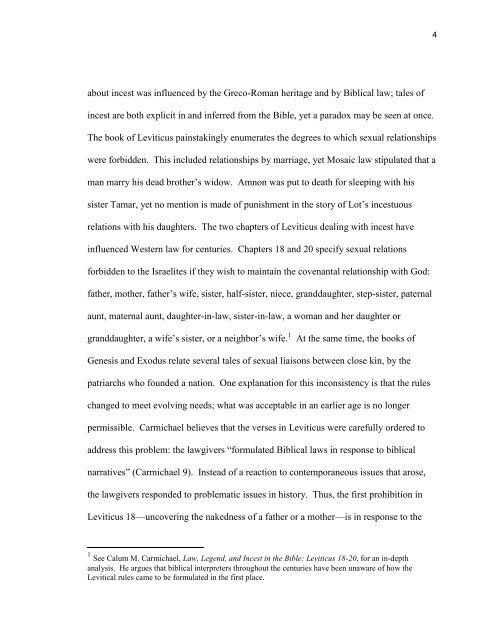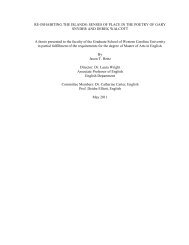SUMMERS, KAREN CRADY, Ph.D. Reading Incest - The University ...
SUMMERS, KAREN CRADY, Ph.D. Reading Incest - The University ...
SUMMERS, KAREN CRADY, Ph.D. Reading Incest - The University ...
You also want an ePaper? Increase the reach of your titles
YUMPU automatically turns print PDFs into web optimized ePapers that Google loves.
4<br />
about incest was influenced by the Greco-Roman heritage and by Biblical law; tales of<br />
incest are both explicit in and inferred from the Bible, yet a paradox may be seen at once.<br />
<strong>The</strong> book of Leviticus painstakingly enumerates the degrees to which sexual relationships<br />
were forbidden. This included relationships by marriage, yet Mosaic law stipulated that a<br />
man marry his dead brother’s widow. Amnon was put to death for sleeping with his<br />
sister Tamar, yet no mention is made of punishment in the story of Lot’s incestuous<br />
relations with his daughters. <strong>The</strong> two chapters of Leviticus dealing with incest have<br />
influenced Western law for centuries. Chapters 18 and 20 specify sexual relations<br />
forbidden to the Israelites if they wish to maintain the covenantal relationship with God:<br />
father, mother, father’s wife, sister, half-sister, niece, granddaughter, step-sister, paternal<br />
aunt, maternal aunt, daughter-in-law, sister-in-law, a woman and her daughter or<br />
granddaughter, a wife’s sister, or a neighbor’s wife. 1<br />
At the same time, the books of<br />
Genesis and Exodus relate several tales of sexual liaisons between close kin, by the<br />
patriarchs who founded a nation. One explanation for this inconsistency is that the rules<br />
changed to meet evolving needs; what was acceptable in an earlier age is no longer<br />
permissible. Carmichael believes that the verses in Leviticus were carefully ordered to<br />
address this problem: the lawgivers “formulated Biblical laws in response to biblical<br />
narratives” (Carmichael 9). Instead of a reaction to contemporaneous issues that arose,<br />
the lawgivers responded to problematic issues in history. Thus, the first prohibition in<br />
Leviticus 18—uncovering the nakedness of a father or a mother—is in response to the<br />
1 See Calum M. Carmichael, Law, Legend, and <strong>Incest</strong> in the Bible: Leviticus 18-20, for an in-depth<br />
analysis. He argues that biblical interpreters throughout the centuries have been unaware of how the<br />
Levitical rules came to be formulated in the first place.
















